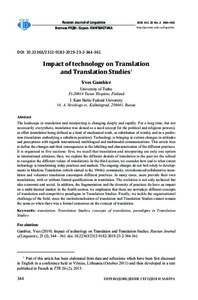Impact of technology on Translation and Translation Studies
Yves Gambier
https://urn.fi/URN:NBN:fi-fe2021042822220
Tiivistelmä
The landscape in translation and interpreting is changing deeply and rapidly. For a long time, but not
necessarily everywhere, translation was denied as a need (except for the political and religious powers),
as effort (translation being defined as a kind of mechanical work, as substitution of words), and as a profession
(translators embodying a subaltern position). Technology is bringing in certain changes in attitudes
and perceptions with regards international, multilingual and multimodal communications. This article tries
to define the changes and their consequences in the labelling and characterisation of the different practices.
It is organised in five sections: first, we recall that translation and interpreting are only one option
in international relations; then, we explain the different denials of translation in the past (or the refusal
to recognize the different values of translation). In the third section, we consider how and to what extent
technology is transforming today practices and markets. The ongoing changes do not boil solely to developments
in Machine Translation (which started in the 1960s): community, crowdsourced/collaborative translation
and volunteer translation encompass different practices. In many cases, users provide their own
translations, with or without formal qualifications in translation. The evolution is not only technical but
also economic and social. In addition, the fragmentation and the diversity of practices do have an impact
on a multi-faceted market. In the fourth section, we emphasize that there are nowadays different concepts
of translation and competitive paradigms in Translation Studies. Finally, we tackle the organisational
challenge of the field, since the institutionalisation of translation and Translation Studies cannot remain
the same as when there was a formal consensus on the concept of translation.
Keywords: translation, Translation Studies, concepts of translation, paradigms in Translation
Studies
For
Kokoelmat
- Rinnakkaistallenteet [29337]
